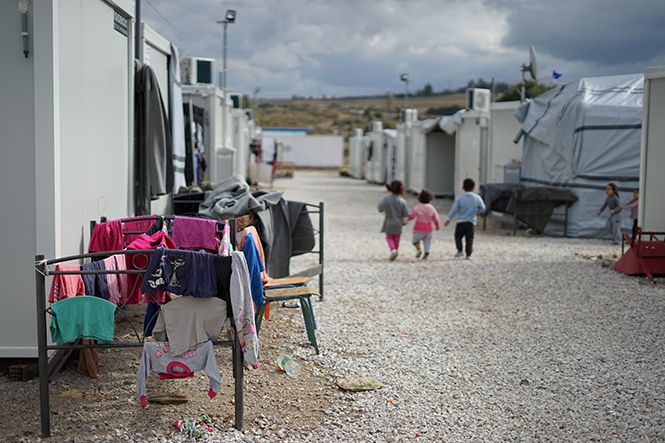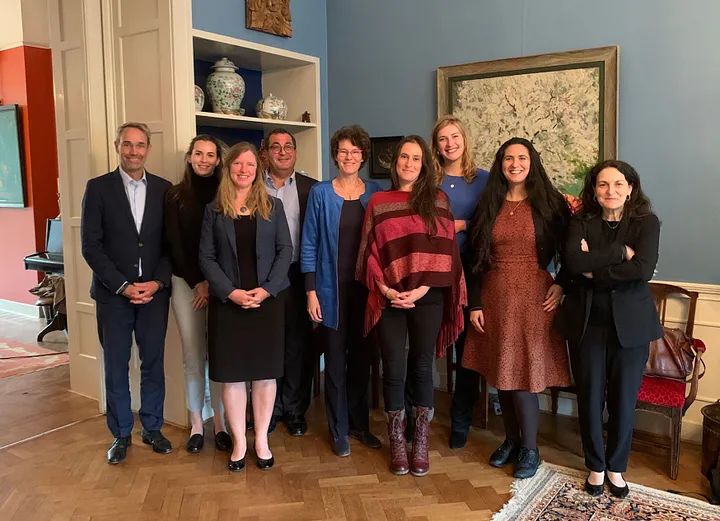A Critical Part of Closing the Global Justice Gap: Providing Justice for Refugees
Contributors: Leah Zamore, Maaike de Langen, Léah Guyot, Nate Edwards
Over 100 million people around the world are forcibly displaced, according to the latest UNHCR estimates as of May 2022. This has increased from 89.3 million people at the end of 2021, requiring countries to find new ways to welcome displaced communities into their economic, social, and health systems. Low- and middle-income countries carry significantly more than their fair share of the responsibility and host over 80 percent of all forcibly displaced people.
Migrants and refugees face an array of challenges and problems as they settle into new countries. They need to access basic services such as health care and education, they need an income, and they need a roof over their heads. Although the focus is often on their need for immediate assistance, most refugees today remain refugees for decades if not generations. As time goes on, so does life and that inevitably comes with justice problems, the most common of which are crime and violence, family conflicts, access to public services, and issues related to work. Many refugees are among the 5.1 billion people globally who do not have meaningful access to justice, as identified in the Justice for All report.
The global refugee response and the efforts to close the global justice gap are deeply interdependent. Today’s global challenges call for more collaboration across sectors in the pursuit of refugees’ access to justice. Some countries have already found success in designing new policy responses born from peoples’ justice needs when existing legal infrastructure proves insufficient. In Colombia, Uganda, and Ukraine, there are innovative efforts to address the justice needs of refugees.
In Colombia, temporary work permits accompanied by a statute for 10-year regularization status for existing migrants not only supports access to work, but also health services. To fill in gaps in coverage, initiatives such as Border Mobility Cards allow migrants along the border to access food, medical care, and education, while a rent-to-own program is targeting the need for affordable housing.
In Uganda, an inclusive refugee response policy has long ensured refugees’ rights to work, to attend school, and to move freely around the country. National health and education integration plans aim to integrate refugees into existing national services and systems while similar integration strategies are planned in the areas of livelihoods, water, and the environment.
Meanwhile, we have witnessed countries in Europe open their borders to those fleeing the war in Ukraine. As of March 4th, the European Union mandated all member states to grant temporary protection to Ukrainian refugees. In Ukraine itself, meanwhile, a grassroots Legal Development Network is providing essential justice services to those enduring the conflict.
These are positive trends, but they are also outliers. With the evolution of global challenges comes changing needs for refugees around the world. Many of those needs take the shape of justice problems that refugees face. They are often unable to stand up for their economic, social, and political rights as they are prevented from accessing employment, housing, healthcare, and education. They also struggle to access judicial and legal systems in the countries in which they seek refuge. They are too often deprived of equal access to justice.
Six key insights can help shape our understanding of how best to provide justice for refugees, as we connect efforts to close the global justice gap within the global refugee response:
The justice problems refugees face go well beyond access to asylum. Some of the main justice concerns of refugees include accessing crucial documentation (e.g. birth or marriage certificates and work permits) and services, such as health, employment, and housing. Lack of access to these activities can lead to precarious economic and social standing, physical and mental health problems, and insecurity thus leading to marginalization. In addition to justice problems encountered in host countries, refugees must also navigate justice issues in their country of origin either from afar or upon return.
Refugees need access to recourse when they face discrimination, extortion, and abuse. Informal status (e.g. working off-the-books and entering informal living situations like housing without contracts) makes refugees vulnerable to such abuses without means of recourse. Even when legal protections do exist, refugee and host communities alike are not often made aware of their rights. Legal empowerment, increasing the capacity of people to understand and use the law, enables refugees to recognize injustices when they happen and provides them with the tools to resolve those problems.
Access to justice also means preventing injustice and addressing the mismatch between refugees and public institutions. Due to their status, refugees are distrusting of law enforcement and often fail to report the crimes and abuses they endure. In response, a growing number of cities have implemented non-inquiry policies that allow people to report crimes without disclosing their immigration status. Similar initiatives could and should be taken to allow refugees to access public services and employment.
Providing justice for refugees must take host-communities’ perspectives into account. Indeed, advocacy for the rights of refugees in juxtaposition to those of local communities can cause frustrations and lead to discrimination against refugees. One way to address this risk is to capture vulnerabilities that encompass broader segments of society, rather than designing policies around specific groups. Host communities and refugees often struggle with similar justice problems, and need similar services to resolve them. Creating people-centered justice services that are inclusive of all groups, can have a broader impact while also addressing specific obstacles refugees encounter.
Investing in better justice services, legal aid, and legal empowerment are actions required to improve access to justice for refugees. Local organizations and refugee-led initiatives should be actively involved in this work as they provide crucial perspectives on effectively identifying the problems refugee communities face and ways to resolve them.
Investing in data and evidence is critical to understanding local challenges and accessing funding. Instruments such as justice needs and satisfaction surveys among refugees, such as the ones conducted by HiiL for UNHCR, are crucial to understanding the problems people face and what works to resolve and prevent them. This evidence can ensure that funding targets local needs effectively and reaches those who are furthest behind first.
While humanitarian aid has been the dominant approach to refugee response for a long time, the global refugee regime is shifting back to its original vision, a people-centered vision, where refugees are integrated into local systems and can enjoy access to their full rights. Understanding the justice problems refugees face, working to resolve and prevent these problems, and giving refugees the access to justice they need to participate in daily life in their host country, should be an integral part of the global humanitarian response for the 100 million people forcibly displaced in our world today.
—
In response to the challenges facing refugees, the Pathfinder for Peaceful, Just, and Inclusive Societies and the Humanitarian Crises program at the NYU Center on International Cooperation have started work on Justice for Refugees. They have brought together experts and stakeholders working for justice and those from the refugee sector to design strategies to resolve and prevent both the unique (related to refugees’ status as refugees) and the common (e.g. related to issues such as workplace rights and access to services) justice problems facing refugees.
The first convening on Justice for Refugees took place in The Hague on May 25th, 2022. Meeting participants identified key takeaways, including refugees’ justice needs, the unique challenges they face, and ways to overcome those. The insights in this blog were drawn from the very inspiring discussion that took place at this meeting.

From left to right: Sam Muller (HiiL), Léah Guyot (Pathfinders), Emily E. Arnold-Fernandez (Asylum Access), Salaheddin al-Bashir (Justice Leaders), Maaike de Langen (Pathfinders), Leah Zamore (NYU CIC), Eva de Boer (Netherlands MFA), Hariwa Adil (UNDP) & Agnes Hurwitz (UNHCR). Not pictured: Ana Uzelac (Netherlands MFA).
Related Resources
